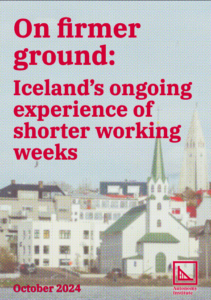This report offers new insight into the programme of working time reduction that has taken place in Iceland, following successful public sector trials in the country.
The report analyses the results of an employment market survey conducted by the Social Science Research Institute (an institute at the University of Iceland) for the Ministry of Social Affairs and Labour and The Administration of Occupational Safety and Health, to understand job patterns, work environment, and the reasons why individuals left paid employment. The survey gathered data between 2021 and 2022.
The report is published in co-operation with The Autonomy Institute.
Key findings:
• The offer of shorter hours has been widespread. In the two years prior to being surveyed, more than half (59%) of workers were offered reduced working hours.
• These changes have had significant worker inputs: in the vast majority (80%) of instances, workers say they were consulted on how reduced hours were implemented in their workplace.
• A large majority of Icelandic workers (78%) are satisfied with their present working time.
• In the public sector, 81% of state-level workers and 82% of municipal workers were satisfied with their working time, while the satisfaction rate was slightly lower – 77% – in the private sector.
• Focusing on those who have seen their hours reduced in the last two years, 62% of workers report being more satisfied with their working time.
• Public sector workers are more likely to be more satisfied with their work time following reductions compared to the private sector (65% of state-level workers and 68% of municipal-level workers were satisfied, compared to 55% of private sector workers).
• In workplaces with higher proportions of women in the workforce, percentages of those indicating greater satisfaction were much higher at 70%, compared to 54% in more male-dominated workplaces.
• 97% of workers thought that shorter working hours had made it easier to balance work with their private life, or at least kept the balance the same as before (with more than half, 52%, thinking it had improved).
• Workers in the public sector were more likely to indicate that reduced working time had made it easier to balance work and private life – 61% of state workers and 55% of municipal workers compared to 42% of private sector workers.
• 42% of those who had moved to shorter hours thought that it had decreased stress in their private life, versus 6% who felt it had increased.



Recent Comments